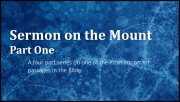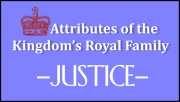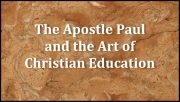
We’ve spent the last couple weeks examining characteristics of royal peoples as they apply to Christians, a people who are unique in that they too are royalty but of a kingdom that is not yet manifest in our world. I can’t think of a better place to start learning about becoming Heavenly Kingdom royalty than to understand The Beatitudes. Jesus’ Sermon on the Mount is one of the most familiar passages in the New Testament. The passage contains what is commonly called “the Beatitudes”. The beatitudes are remarkable in their clarity of meaning, and yet are often completely misunderstood.
Read more: Sermon on the Mount, Part 1

In our continuing study of the character of Kingdom royalty we come to Foresight. Not the ability to see the future or have a premonition, but the ability to take information and plan accordingly. In business it’s called vision, and in the Bible too: “Where there is no vision, the people perish: but he that keepeth the law, happy is he” (Proverbs 29.18, KJV). Foresight, or vision, often leads one to clean direction as in 1 Chronicles 12.32: “From Issachar there were 200 leaders and all their relatives at their command – they understood the times and knew what Israel should do.” So foresight is the art of taking information, understanding the variables and leading in a clear direction.
Read more: Kingdom Royalty - Foresight

The Bible makes it clear that we are children of God, which means we are all princes and princesses of the Kingdom of God. So why do most of us live like confused peasants? While God never promises us health and wealth, those things are often benefits of living wisely (though not always, see the prophet Amos as a great example).
Read more: Kingdom Royalty - Wisdom

A favorite topic of many a pastor is lifestyle evangelism, but I’d prefer to talk about the evangelist’s lifestyle. Rather than discussing a process I’d like to determine a heartbeat. I want to move us beyond mere instruction and to a place of holy living, for a Christian can make no greater impact on the world than to be holy (1 Peter 1.15-16). Paul agrees with Peter when writing to the Church of Corinth:
Read more: Situational Holiness

My junior year of college a fellow undergraduate running for student body president had “Unity” listed as part of his campaign platform. His oath was to unify the student body. During a debate one moderator asked the candidate, “How much unity does the student body have now? How do you intend to increase unity? And how do you measure unity so you know if you have accomplished your goal?” The candidate squirmed. Unity is a nice idea but is difficult to quantify.
Read more: Review: Unity

We should start by saying that the word “moderation” does not appear in the Bible, but the concept is taught throughout. The Greek words often translated as “moderation” are usually translated as “patient” or “gentle”. Patience, gentleness, sobriety, and even grace are all attributes that, in certain contexts, illustrate the modern notion of moderation. The words intend to illustrate an avoidance of excesses, self-restraint, or living within reasonable limits. All these ideas are befitting Kingdom royalty.
Read more: Kingdom Royalty - Moderation

If you’ve been reading this site for long many of the concepts in this article will sound familiar to you. Those concepts had their origins at least 25 years ago when my friend (and roommate at the time) and I sat down to write this editorial for
The Moody Student, the student newspaper for Moody Bible Institute. Russ Carter and I put pen to paper to encourage our fellow students to follow the school’s new program, called Renew 2000. But this is more than a trip down memory lane, it is a succinct statement about prayerful living than I’m sure will change the lives of some of our readers. Without further commentary, here is
Renewing Prayer, by Russ Carter and Tyson Thorne.
Read more: Thursday Throwback: Renewing Prayer

Like II John, the author’s only reference to himself is the “elder.” There are, however, clear stylistic ties between all three letters, as well as the tradition of early church fathers, which attribute all three epistles to the apostle John. Once again, there is little evidence of the time of composition, but it is reasonable to suggest that all three were written sometime in the early (AD) 60’s. III John differs from the first two letters, however, as it is a personal correspondence to a single individual, rather than a church. It seems to suggest that, despite the possibility of incurring the wrath of his church bishop, Gaius ought to welcome the bearer of the letter to his home as a servant of the Lord. John tells of his disappointment with Diotrephes, and suggests that he will set things right on his next visit. The big idea of this letter is clear: A knowledge of God is evidenced in faithfully attending to God’s people, regardless of the consequences. A fitting message for today’s pastors.
Read more: 3 John

We closed yesterday with the observation that “Only an evil ruler looks to satisfying his own needs before the needs of his people and the future of his kingdom.” A good royal, on the other hand, has a zeal for the public welfare. The phrase “public welfare” is a loaded term today with mostly political ramifications, but in this case the term is much broader in its meaning. In the ancient kingdom of Israel the welfare of the people could entail building public roads, seaside docks and marketplaces. Lowering taxes, assuring the people had what they needed for the annual sacrifices, and the practice of gleaning were all used to assist the people. God even implemented a system of forgiveness of debts every seven years. The term “public welfare” applies to every facet of life, not simply free money from the government.
Read more: Kingdom Royalty - Zeal for the Public Welfare

As Kingdom royalty we are required to have an understanding of Justice. In today’s world the term justice is usually perceived as a legal term that results in a fine, jail time or possibly even execution. In biblical terminology justice can mean those things, but is much broader in use and practice. Justice is a God-ordained action that upholds the well-being and equality of all people -- and this guiding principle applies to both external legal action as well as the internal attitude of one’s heart.
Read more: Kingdom Royalty - Justice

I just recently finished writing my own commentary on 1 Corinthians. One of the many things this task taught me is how concerned the apostle Paul is with Christian Education (CE). The first issue Paul takes us in this letter is that of Christian educators, and the quarrels that arose from following the teacher rather than the teachings (1.10-.17). Over and over, from verse 10 of the first chapter to verse four of the 12 and on through the book Paul emphasizes the need for unity in CE.
Read more: Paul and Christian Education

John’s second letter followed closely on the heels of the first, so we find many of the same themes and the same problem being addressed -- namely the false teachings of Cerinthus. Once more we find the apostle John not clearly identifying himself by name, but rather by literary style and through tradition. This is characteristic of all of John’s epistles and unlike his gospel and book of revelation. The big idea John communicates in this epistle is also similar, only instead of Fellowship with God leading to obedience and a love for their brothers and sisters he proclaims that love for God results in obedience and the ability to resist false teachings.
Read more: 2 John























